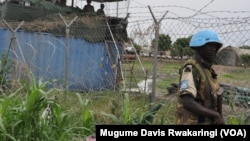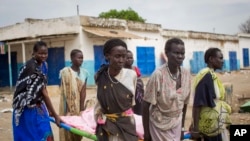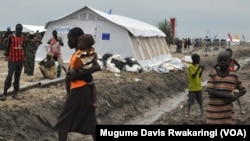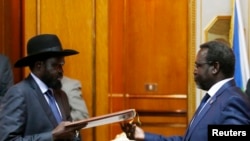MALAKAL —
Matthew Chol Jok used to work as director general of a sanitation and environment company in Upper Nile state, in the northeast of South Sudan.
The 61-year-old remembers how his town was vibrant and full of life. People worked all kinds of different jobs to make a living. Children went to school. Malakal was bustling.
But then the war came.
Malakal wasn't immediately drawn into the violence when fighting broke out in mid-December in Juba, but when the unrest finally did reach the town, it was fierce and prolonged.
For months, government soldiers battled opposition forces for control of the capital of Upper Nile, the state that produces the bulk of the oil that is the lifeblood of South Sudan's economy. Malakal changed hands several times and ordinary citizens like Jok were forced to flee their homes and seek shelter at the U.N. Mission in South Sudan (UNMISS) base in the town.
In th five months that he's been at the camp, Jok has not dared to venture outside, not even to go and check on his house.
"I cannot step three steps at the main gate to go out," he says. "I can be killed.”
Jok left everything behind when he ran for his life as fighting engulfed the town. He's not sure what happened to members of his family, and fears some of his children might have been killed in the unrest.
"I am hearing that some went to Ethiopia and some went to Khartoum and some are in Juba. Some of my children were abroad, and they arrived the second day of the crisis. All of them were caught up in the fighting and where they are now is not known," he says helplessly.
In a sense, Veronica Chan is luckier than Jok. Yes, she lives in the same deplorable conditions inside the U.N. compound as he does, but her six children and her husband are alive and with her. The family lives in a small mud house inside the UNMISS compound. Life is hard in the camp, Chan says, but at least the family is together.
Like Jok, Chan says she is too afraid to leave the camp. Besides, she says, she has nothing to go back to in Malakal.
"My house was totally burnt down. I even don’t have any neighbors to live with. I cannot go back,” she says.
Trudging through thick mud brought on by heavy rains, Chan worries about the future of her children. No one has organized classes for kids at the UNMISS camp and Chan's children are not going to school.
Outside the camp, schools were closed when the fighting erupted in Malakal several months ago, and last week the United Nations Children’s Fund (UNICEF) said men in uniform were occupying schools in three states, including Upper Nile.
The state has seen some of the heaviest fighting of the conflict as the two sides battle for control of some of South Sudan's most productive oil fields.
Before the conflict, oil fields in Upper Nile produced around 200,000 barrels per day of oil. Reports by international news agencies last month said oil production in South Sudan has fallen by around 30 percent since the fighting began in December.
The U.N. Security Council last month unanimously adopted a resolution to extend UNMISS's mandate for six months, and to change its focus from promoting development and nation-building to protecting civilians and ending the violence in South Sudan.
Among other duties, the new mandate calls on UNMISS "to deter violence against civilians, including foreign nationals ... in areas at high risk of conflict including, as appropriate, schools, places of worship, hospitals and the oil installations, in particular when the Government of the Republic of South Sudan is unable or failing to provide such security."
On Monday, UNMISS inaugurated a new facility that it would probably have preferred not to open: a PoC, or Protection of Civilians site right next to the Malakal base.
The new 100,000-square-meter facility can accommodate 8,000 to 9,000 displaced persons -- around half the number of civilians who are sheltering at U.N. facilities in Malakal.
Even before the facility was officially inaugurated, 3,100 people had been moved to the new site from the cramped, unsanitary U.N. facility where they have lived for nearly half a year.
Malakal has been relatively calm since President Salva Kiir and opposition leader Riek Machar signed a new ceasefire agreement in May -- replacing the ceasefire agreement signed in January but never respected. However, few of the residents of Malakal who have been sheltering at the UNMISS base are willing to return to their homes, even if they still exist.
Leaving the U.N. camp is too dangerous, says Jok. He is not optimistic that things will change for the better in the near future, even if Mr. Kiir and Machar sign yet another peace deal. The two rivals in South Sudan's conflict were meeting with regional leaders in Addis Ababa on Tuesday to try to chart a way out of six months of bloodshed in South Sudan.
"They sign things, but they don’t fulfill their promises,” Jok said.
UNMISS chief Hilde Johnson said during a brief Monday visit to Malakal to open the new PoC site the cycle of violence in the town has destroyed people's trust in the government and the opposition.
"When they have tried to trust that stability is here again, the town is retaken again. So until they see complete peace over a long stretch of time, it seems that they won’t feel that they are safe,” she said.
The 61-year-old remembers how his town was vibrant and full of life. People worked all kinds of different jobs to make a living. Children went to school. Malakal was bustling.
But then the war came.
Malakal wasn't immediately drawn into the violence when fighting broke out in mid-December in Juba, but when the unrest finally did reach the town, it was fierce and prolonged.
For months, government soldiers battled opposition forces for control of the capital of Upper Nile, the state that produces the bulk of the oil that is the lifeblood of South Sudan's economy. Malakal changed hands several times and ordinary citizens like Jok were forced to flee their homes and seek shelter at the U.N. Mission in South Sudan (UNMISS) base in the town.
In th five months that he's been at the camp, Jok has not dared to venture outside, not even to go and check on his house.
"I cannot step three steps at the main gate to go out," he says. "I can be killed.”
Jok left everything behind when he ran for his life as fighting engulfed the town. He's not sure what happened to members of his family, and fears some of his children might have been killed in the unrest.
"I am hearing that some went to Ethiopia and some went to Khartoum and some are in Juba. Some of my children were abroad, and they arrived the second day of the crisis. All of them were caught up in the fighting and where they are now is not known," he says helplessly.
'I cannot go back'
In a sense, Veronica Chan is luckier than Jok. Yes, she lives in the same deplorable conditions inside the U.N. compound as he does, but her six children and her husband are alive and with her. The family lives in a small mud house inside the UNMISS compound. Life is hard in the camp, Chan says, but at least the family is together.
Like Jok, Chan says she is too afraid to leave the camp. Besides, she says, she has nothing to go back to in Malakal.
"My house was totally burnt down. I even don’t have any neighbors to live with. I cannot go back,” she says.
Trudging through thick mud brought on by heavy rains, Chan worries about the future of her children. No one has organized classes for kids at the UNMISS camp and Chan's children are not going to school.
Outside the camp, schools were closed when the fighting erupted in Malakal several months ago, and last week the United Nations Children’s Fund (UNICEF) said men in uniform were occupying schools in three states, including Upper Nile.
The state has seen some of the heaviest fighting of the conflict as the two sides battle for control of some of South Sudan's most productive oil fields.
Before the conflict, oil fields in Upper Nile produced around 200,000 barrels per day of oil. Reports by international news agencies last month said oil production in South Sudan has fallen by around 30 percent since the fighting began in December.
The U.N. Security Council last month unanimously adopted a resolution to extend UNMISS's mandate for six months, and to change its focus from promoting development and nation-building to protecting civilians and ending the violence in South Sudan.
Among other duties, the new mandate calls on UNMISS "to deter violence against civilians, including foreign nationals ... in areas at high risk of conflict including, as appropriate, schools, places of worship, hospitals and the oil installations, in particular when the Government of the Republic of South Sudan is unable or failing to provide such security."
On Monday, UNMISS inaugurated a new facility that it would probably have preferred not to open: a PoC, or Protection of Civilians site right next to the Malakal base.
The new 100,000-square-meter facility can accommodate 8,000 to 9,000 displaced persons -- around half the number of civilians who are sheltering at U.N. facilities in Malakal.
Even before the facility was officially inaugurated, 3,100 people had been moved to the new site from the cramped, unsanitary U.N. facility where they have lived for nearly half a year.
'They sign things, but they don’t fulfill their promises'
Malakal has been relatively calm since President Salva Kiir and opposition leader Riek Machar signed a new ceasefire agreement in May -- replacing the ceasefire agreement signed in January but never respected. However, few of the residents of Malakal who have been sheltering at the UNMISS base are willing to return to their homes, even if they still exist.
Leaving the U.N. camp is too dangerous, says Jok. He is not optimistic that things will change for the better in the near future, even if Mr. Kiir and Machar sign yet another peace deal. The two rivals in South Sudan's conflict were meeting with regional leaders in Addis Ababa on Tuesday to try to chart a way out of six months of bloodshed in South Sudan.
"They sign things, but they don’t fulfill their promises,” Jok said.
UNMISS chief Hilde Johnson said during a brief Monday visit to Malakal to open the new PoC site the cycle of violence in the town has destroyed people's trust in the government and the opposition.
"When they have tried to trust that stability is here again, the town is retaken again. So until they see complete peace over a long stretch of time, it seems that they won’t feel that they are safe,” she said.










